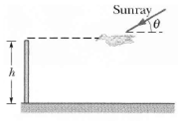In Figure, an albatross glides at a constant 15 m/s horizontally above level ground, moving in a
Question:
(a) Across the level ground and then
(b) Up the wall? Suppose that later a hawk happens to glide along the same path, also at 15 m/s. You see that when its shadow reaches the wall, the speed of the shadow noticeably increases.
(c) Is the Sun now higher or lower in the sky than when the albatross flew by earlier?
(d) If the speed of the hawk's shadow on the wall is 45 m/s, what is the angle θ of the Sun just then?

Fantastic news! We've Found the answer you've been seeking!
Step by Step Answer:
Related Book For 

Fundamentals of Physics
ISBN: 978-0471758013
8th Extended edition
Authors: Jearl Walker, Halliday Resnick
Question Posted:





